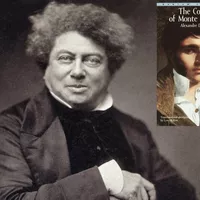Chapter 2. Father and Son (1)
We will leave Danglars struggling with the demon of hatred, and endeavoring to insinuate in the ear of the shipowner some evil suspicions against his comrade, and follow Dantes, who, after having traversed La Canebiere, took the Rue de Noailles, and entering a small house, on the left of the Allees de Meillan, rapidly ascended four flights of a dark staircase, holding the baluster with one hand, while with the other he repressed the beatings of his heart, and paused before a half-open door, from which he could see the whole of a small room. This room was occupied by Dantes' father.
The news of the arrival of the Pharaon had not yet reached the old man, who, mounted on a chair, was amusing himself by training with trembling hand the nasturtiums and sprays of clematis that clambered over the trellis at his window. Suddenly, he felt an arm thrown around his body, and a well-known voice behind him exclaimed, "Father--dear father! The old man uttered a cry, and turned round; then, seeing his son, he fell into his arms, pale and trembling.
"What ails you, my dearest father?
Are you ill?" inquired the young man, much alarmed. "No, no, my dear Edmond--my boy--my son!--no; but I did not expect you; and joy, the surprise of seeing you so suddenly--Ah, I feel as if I were going to die.
"Come, come, cheer up, my dear father!
'Tis I--really I! They say joy never hurts, and so I came to you without any warning. Come now, do smile, instead of looking at me so solemnly. Here I am back again, and we are going to be happy. "Yes, yes, my boy, so we will--so we will," replied the old man; "but how shall we be happy?
Shall you never leave me again? Come, tell me all the good fortune that has befallen you. "God forgive me," said the young man, "for rejoicing at happiness derived from the misery of others, but, Heaven knows, I did not seek this good fortune; it has happened, and I really cannot pretend to lament it.
The good Captain Leclere is dead, father, and it is probable that, with the aid of M. Morrel, I shall have his place. Do you understand, father? Only imagine me a captain at twenty, with a hundred louis pay, and a share in the profits! Is this not more than a poor sailor like me could have hoped for? "Yes, my dear boy," replied the old man, "it is very fortunate.
"Well, then, with the first money I touch, I mean you to have a small house, with a garden in which to plant clematis, nasturtiums, and honeysuckle.
But what ails you, father? Are you not well? " 'Tis nothing, nothing; it will soon pass away"--and as he said so the old man's strength failed him, and he fell backwards.
"Come, come," said the young man, "a glass of wine, father, will revive you.
Where do you keep your wine? "No, no; thanks.
You need not look for it; I do not want it," said the old man. "Yes, yes, father, tell me where it is," and he opened two or three cupboards.
"It is no use," said the old man, "there is no wine.
"What, no wine?
said Dantes, turning pale, and looking alternately at the hollow cheeks of the old man and the empty cupboards. "What, no wine?
Have you wanted money, father? "I want nothing now that I have you," said the old man.
"Yet," stammered Dantes, wiping the perspiration from his brow,--"yet I gave you two hundred francs when I left, three months ago.

